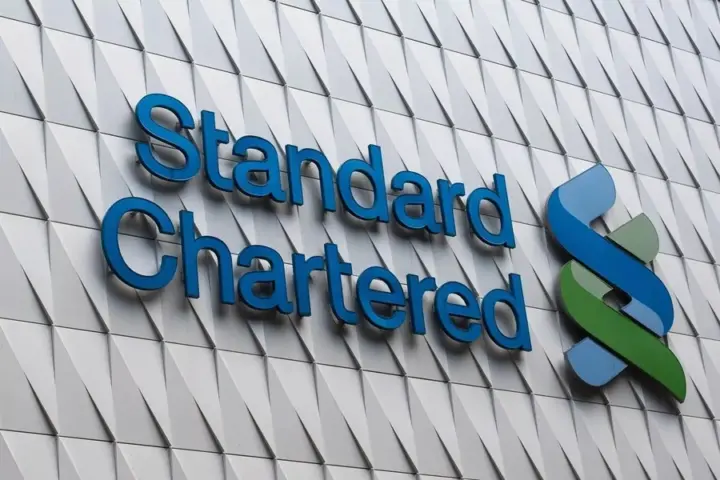Standard Chartered has reaffirmed its long-standing commitment to supporting Africa’s growth by committing significant financial resources, strategic partnerships, and innovative banking solutions to help address the continent’s development challenges.
At a recent gathering of policymakers, investors, and corporate leaders in Johannesburg, the bank’s Group Chief Executive Officer reiterated that Africa remains central to the institution’s expansion strategy. He emphasized that Standard Chartered plans to channel capital into areas such as infrastructure development, sustainable trade finance, climate action, healthcare, and SME growth—a pivot that aligns with its aim to foster inclusive and resilient economic progress.

The bank cited the continent’s vast potential—driven by demographic dynamism, expanding digital economies, and increasing intra-African trade—and pledged to deliver more financing under its ‘Digital Trade’ and ‘Sustainability Bond’ offerings. According to executives, the bank intends to deploy new credit lines and advisory services worth several billions of dollars over the next five years. These efforts are meant to enhance liquidity in development-critical sectors and accelerate the financing of projects that deliver social and economic returns.
While acknowledging macroeconomic headwinds—such as currency volatility, regulatory unpredictability, and fragmented regional markets—Standard Chartered pledged to work closely with governments, multilateral institutions, and private sector partners to develop tailored solutions. This includes structuring blended finance deals, risk-sharing arrangements, and guarantee facilities to mitigate project-level risks and attract further capital from institutional investors.
In the infrastructure space, the bank highlighted recent support for major housing and renewable energy projects in West and East Africa. In one example, it provided advisory and transaction support for a private solar farm that added 100 megawatts to a national grid. In another, it arranged financing for an affordable housing initiative designed to create more than 5,000 homes for low-income urban dwellers in Ghana.
Standard Chartered is also expanding its role in trade finance. With the African Continental Free Trade Area (AfCFTA) gaining traction, the bank committed to increasing supply chain financing from current exposure levels, especially for small and medium-sized enterprises. It has announced plans to expand its digital documentary trade platforms on the continent, aiming to reduce friction for exporters and importers and foster smoother cross-border commerce.
To support healthcare, the bank has begun structuring private-sector investments in pandemic preparedness and health infrastructure through facility-backed bonds and capital raising for hospitals and diagnostic clinics. In parallel, it is promoting investment-grade sustainable bonds that finance green infrastructure—such as wind farms, waste-to-energy plants, and solar installations—with built-in environmental reporting.
Standard Chartered’s leadership also pointed to efforts being made in financial inclusion, noting that underserved and informal businesses now have access to tailored products, including credit lines and transaction services integrated with mobile platforms. These partnerships with fintechs and local financial institutions are designed to reduce barriers to banking for low-income entrepreneurs, thereby enabling them to participate more fully in economic growth.
In remarks delivered at the event, a senior bank official stressed that the institution views its role not just as a financier but also as a capacity-builder: offering advisory to governments on project structuring, regulatory standards, and blended financing frameworks. The bank is funding training and technical assistance programs aimed at helping local project sponsors meet international bankability standards.
Standard Chartered acknowledged that delivery depends on strong implementation environments. As such, the bank stated it will offer support for policy advocacy, advising on reforms that encourage public–private partnerships, investment-grade regulation, and improved governance in public financial systems.
Observers say the bank’s renewed Africa focus comes at a time when international capital is increasingly cautious but African governments and entrepreneurs remain in need of cash to drive infrastructure and social development. This makes partnerships with financially credible institutions like Standard Chartered especially relevant.
In industry circles, analysts note that while other international banks have scaled back in Africa, Standard Chartered is deepening its engagement rather than retreating. Its presence in over 25 African markets, and its ability to blend global resources with local execution, gives it a comparative advantage in funding projects that generate economic and social impact.
Critics remind stakeholders that impact will depend not just on funding pledges but follow-through. They say that infrastructure projects in Africa have historically been slowed by bureaucratic delays, land disputes, and cost overruns. For the bank’s initiatives to succeed, external stakeholders—including governments and development partners—must ensure that deals are executed on time, transparently, and with community buy-in.
Standard Chartered said that it is launching transparent reporting mechanisms to track project outcomes, social impact, job creation, and environmental performance—especially for its sustainability-linked instruments. The bank aims to publish periodic impact results, helping investors and governments monitor how funds are being used and what value is delivered.
Economic development experts view this announcement as a strong indicator of renewed private-sector confidence in Africa’s long-term potential. If capital pledges translate into practical outcomes, Standard Chartered’s Africa-first strategy could support transformative projects in energy, housing, trade, and digital space—and help address long-term challenges such as youth unemployment, infrastructure deficit, and climate vulnerability.
As Africa continues to pursue its development objectives amid demographic shifts and evolving global trade patterns, the bank’s message was clear: Africa matters, and institutions can play a decisive role in financing its rise. The depth of engagement may determine whether the promises made become catalysts for tangible growth and structural change across the continent.
Support InfoStride News' Credible Journalism: Only credible journalism can guarantee a fair, accountable and transparent society, including democracy and government. It involves a lot of efforts and money. We need your support. Click here to Donate
